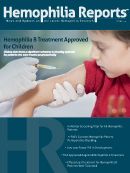Hemophilia B Treatment Approved for Children
The FDA has approved Rixubis for the treatment of hemophilia B in children, manufacturer Baxter International Inc. announced.

A coagulation factor recombinant has been approved by the Food and Drug Administration (FDA) to treat children with hemophilia B.
Manufacturer Baxter International Inc. announced in a press release that its drug, Rixubis, is the first recombinant factor IX approved for routine prophylaxis and control of bleeding episodes in the US for adults living with hemophilia B.
Evidence for Rixubis’ approval was based on the results of a clinical trial to investigate its safety and efficacy. Results of the study were presented at the 55th Annual Meeting of the American Society of Hematology in New Orleans, Louisiana. Researchers studied 23 previously-treated male patients who were aged 12 years or less with severe or moderately severe hemophilia B.
Patients enrolled in the study were administered Rixubis 2 times per week (mean dose 56 IU/kg) for an average of 6 months. Patients recorded an average of 54 exposure days (EDs). A majority of enrolled participants (9 patients, 39.1 percent) experienced no bleeding episodes and 23 bleeding episodes (88.5 percent) were treated with 1-2 infusions. There were no reports of inhibitor development, severe allergic reactions, or thrombotic or treatment-related adverse events in any of the study patients.
“In addition to the positive reception we've received from adult Rixubis patients, the approval for pediatric patients offers a valuable new option, particularly as our clinical data demonstrated a significant reduction in bleeding episodes for patients who were treated prophylactically, an important factor for this young patient population,” John Orloff, MD, vice president of global research and development at Baxter BioScience, continued in the press release.
Common side effects observed in the clinical trial patients (>1 percent) included dysgeusia, pain in extremity, and positive tests for furin antibody. Products which contain factor IX have been associated with the development of thromboembolic complications, the manufacturer noted. Physicians should monitor patients with liver disease, fibrinolysis, peri- and post-operatively for early signs of thromboembolic, consumptive coagulopathy, and disseminated intravascular coagulation when using Rixubis. The drug is not recommended for induction of immune tolerance in patients with hemophilia B.
Currently, approval for the drug’s use in adults and children is pending in the European Union. It has already gained regulatory approval in Australia already. The manufacturer also develops medications for the treatment of immune disorders, cancer, infectious diseases, kidney disease, trauma, and other chronic and acute medical conditions in addition to its work in hemophilia treatment.
